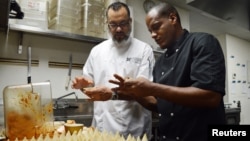Cuban chef Michael Alejandro Calvo Oviedo was trained in France and knows how to cook, but the Miami kitchens where he has spent the last few days working have made his eyes pop.
"You go to the supermarket in Cuba and there's only fish, so that's what you cook," said the 37-year-old chef of Havana's Atelier restaurant. "Here you have everything."
Calvo is one of four chefs from private restaurants in Cuba who were invited to spend a week in Miami honing their business acumen and blending culinary cultures as relations between the two countries slowly warm.
Private restaurants, known as "paladares," cropped up in people's homes during Cuba's economic crisis in the 1990s. They have gained official approval as the Communist government takes cautious steps to reduce the role of the state in the economy.
"The idea here is that we're exposing people to the realities of what these people face in Cuba, but at the same time giving them an opportunity to learn and showcase their cooking," said Tomas Bilbao, executive director of the Cuba Study Group.
The group, which favors the warming of ties between the United States and Cuba, organized the trip with $50,000 from the John S. and James L. Knight Foundation and the help of some of Miami's top chefs.
Following a historic agreement last December, the two countries last month restored diplomatic relations after 54 years. The U.S. flag was ceremoniously raised again at the embassy in Havana on Friday.
Miami is home to a large Cuban exile population which is divided about president Barack Obama's policy of engagement with the island, with older Cuban-Americans still bitter over the 1959 Revolution led by Fidel Castro.
Calvo, whose cooking blends French and Caribbean styles, has the kitchen skills to run a restaurant, but says he lacks the financial know-how to thrive as Cuba opens up its economy to private enterprise.
"I need to learn how to do the accounting, how to drive costs down," he said.
He studied cooking at France's legendary Institut Paul Bocuse on the outskirts of Lyon. Back in Havana, that experience translated into plates like a spin on France's duck a l'orange featuring sour orange, minty hierbabuena, and mildly spicy Caribbean peppers.
He hopes the experience will put him in a good position if Cuba's controls over private businesses loosen further.
"We need it to be easier for the private sector in Cuba sustain itself long term," he said.





